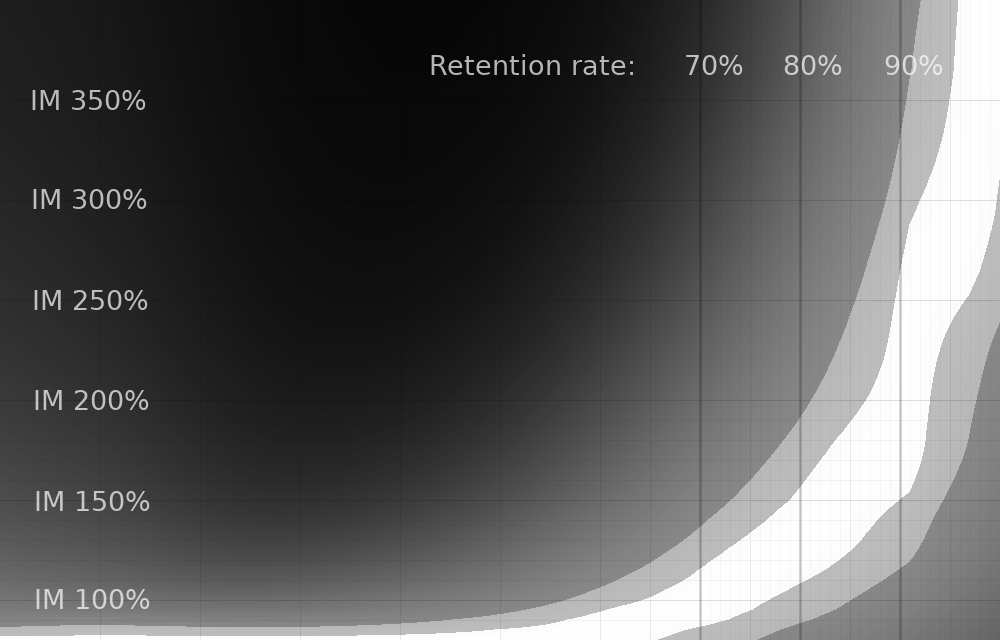

We'll see along the way if this fact is possible and/or necessary to incorporate into our model. In reality it's not true: people grow tired during the review process and their forgetting function will increase the more daily reviews they have. This condition is linear: it does not matter how much new cards per day you have, since every card is independent of others, so the very same set of settings will suffice whether you have 5 new cards per day or 20. The condition of optimality is therefore this: daily increase in the number of known cards, divided by the number of daily reviews, should be maximal. To make the process stable we also want the average increase in the number of known cards to stay the same on average, which will restrict the forgetting function further.

Therefore, on a given day the user has a number of daily reviews and an expected number of cards he remembers from the whole collection (let's call it number of known cards), where the first one stays the same and the second increases day to day. For each of these cards we know the value of forgetting function for this day, therefore we can calculate the mathematical expectation of the number of cards the user will remember if he were to review the whole collection today (we are not generally interested in cards the user has seen recently so we can restrict this to the cards that were reviewed earlier than a couple of weeks ago, or cards for which the time step between reviews is bigger than a given value, which is known as "mature cards", but that's not important in principle) Then at any given day the user has the same daily number of cards to review, and he also has all the cards in his deck that he has already seen: some of them he forgot already, some of them he'll forget in the near future and some of them he'll review before forgetting (apparently some of them he'll never forget, too). In fact, this condition would be used as a restriction for possible forgetting functions in our model. What does optimization mean in this context? We should assume that, as it usually happens with Anki, a user has a big enough deck of cards from which he pulls a number of new cards every day (typically 5 to 20), and that the user started the deck some time ago so that the number of daily reviews has stabilized: provided that the reviews go as expected by our forgetting function, the user will have roughly the same number of daily reviews no matter how long he continues this routine. This function (we'll call it the forgetting function) is influenced by future reviews, whether passed or failed, and it's the task of the algorithm to optimize the dates of the future reviews for all the cards. Using this information about exposures and answers we should construct a function that, for a given card, will give a probability of an incorrect answer ("forget") on a given day in the future.
#Optimized anki settings how to#
That data, properly analyzed, can give us insights into how to optimize the core algorithm so that Anki is utilised in the most efficient way (or at least in the most efficient way we can think of)Ī general model for a SRS is such: for a given card there's a number of times when it was exposed to a user, and for every exposure we know the answer the user gave (for now let's suppose the possible answers are only "remember" and "don't remember", lumping all of the Easy, Normal and Hard into the first category).
#Optimized anki settings full#
Luckily, there's a single thing Anki does right, and that's saving the full statistics of answers for statistic purposes. Understanding how the memory really works lies outside of the scope of the current project.

An algorithm that starts with an oversimplification will inevitably be far from the most efficient. And even if such an implementation is consistently made, it'd be as good as the Ebbinghaus model itself, which may sound good as a theoretical tool but is rather questionable when it comes to how people actually remember things: anyone can use their experience to understand that the real process is way more complicated. Nevertheless, there are only a few attempts at implementing the algorithm starting from the theoretical framework cited by Anki's inspiration Supermemo, that is, Ebbinghaus forgetting curve. There is a bunch of addons that implement various fixes, and some of these are apparently better than others. It does not work well with default settings, nor is there any good reasons for choosing a different set of settings, other than intuition. Everyone who used Anki for a prolonged period of time knows that its algorithm that determines review periods for cards is far from perfect.


 0 kommentar(er)
0 kommentar(er)
